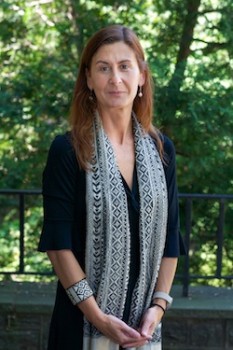CPGC Welcomes New Global Leader for Peace

Details
As Haverford launches into the new school year, the Center for Peace and Global Citizenship (CPGC) welcomes Araceli (Arancha) Garcia del Soto as the new Global Leader for Peace. Garcia del Soto, who is teaching a course and leading a series of workshops at Haverford exploring different approaches to discrimination and global humanitarian efforts, is the second Global Leader for Peace in the College's history. She succeeds Guatemalan activist and attorney Jorge Morales-Toj in this leadership role, which was created to enhance the internationalization of the Haverford community by inviting a scholar or activist to be a part of campus life.
She holds a degree in psychology from the Universidad Pontificia de Salamanca, a masters in social sciences from the Center of Advanced Social Studies of the Juan March Foundation in Madrid, and a Ph.D. in sociology from the University of Salamanca in Spain. Garcia del Soto is affiliated with the Institute of Humanitarian Affairs at Fordham University and was previously the director of refugee initiatives at the Solomon Asch Center for the Study of Ethnopolitical Conflcit at the University of Pennsylvania (currently based at Bryn Mawr College). Garcia del Soto has lectured worldwide on humanitarian programs and psychosocial interventions with populations affected by violence. She has collaborated with international NGOs and local community organizations, and implemented projects in the Balkans, West Africa, Latin America, Iraq and Sri Lanka.
Garcia del Soto says she was drawn to Haverford because she felt her work would tie in well with the overall mission of the CPGC.“I always thought that the Center was pretty unique because it is hard to find places that are integrating education, research and action so effectively,” she says.
She, too, focuses on both the theoretical (research) and the practical (action) with her on-the-ground networking and policy work abroad as well as her scholarly approach to international issues within a theoretical framework, and the need to do advocacy through teaching and workshops. In this vein, the class she is teaching this semester is entitled“World Conflict and Humanitarian Studies: Critical Theory and Alternative Actions.” The course investigates regulations and protocols in humanitarian work, including new approaches to programs employed in conflict scenarios, emphasizing community and participatory approaches.
In addition, Garcia del Soto will run three workshops on campus. The series will kick off with“Against Gender Discrimination” on September 22, which will look at the most recent UN guidelines on gender violence, the Inter-Agency Standing Committee (which works to coordinate humanitarian programs), and several programs run by community based organizations, and will include simulations, group work, videos and a culminating group discussion.
Future workshops will focus on“Critical and Participatory Approaches in Humanitarian Work” and“Human Rights Applied Work.” As with other aspects of her studies, the workshops center on the integration of the concrete, and reflection/analysis.“The main goal for these workshops is to intensely focus on applied knowledge,” she says.“They bring together theoretical frameworks and applied experiences—the work that practitioners do.”
With the whirlwind of the semester already sweeping her along, Garcia del Soto is excited about the months ahead. Her biggest focus, it is clear, is her students, whose accomplishments and ideas she is even more eager to discuss than her own work (“It's not about me— it's about the students and the people they want to work with” she says.)
Having heard the campus-wide jokes about students living in the“Haverbubble,” Garcia del Soto sees her role as getting her students truly engaged in the world beyond the campus community.
“There's a paradox there,” she says.“While living in this ‘bubble,' most students are looking to eventually be out there working with a population that is more diverse. I think Haverford is a great place to provide the safe and secure learning environment that can help them prepare to go out and start working with others.”
—Prarthana Jayaram '10



